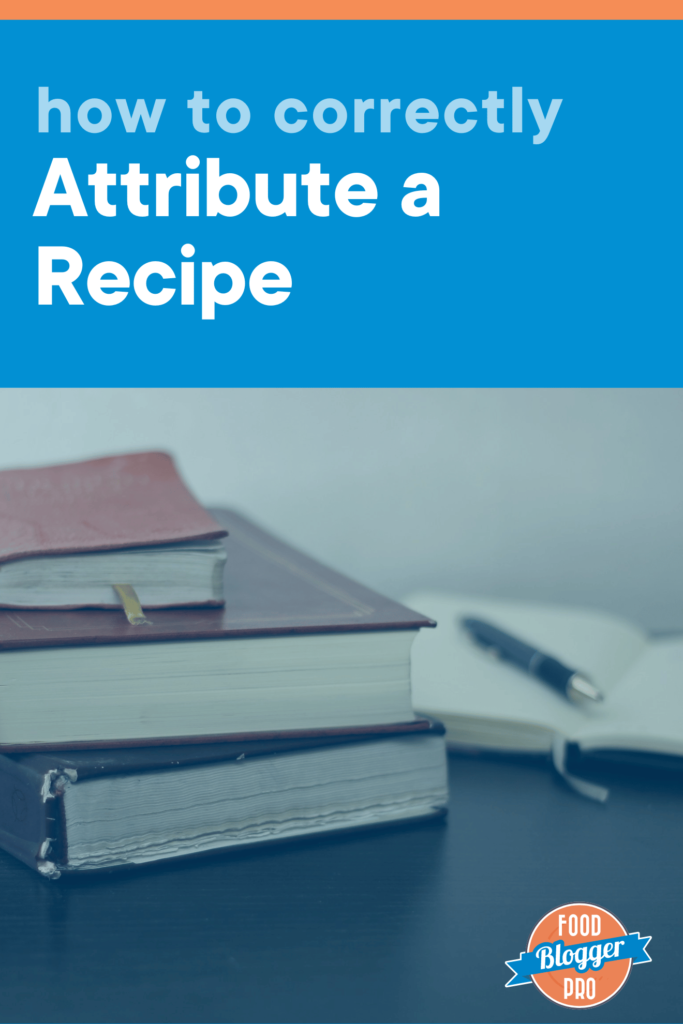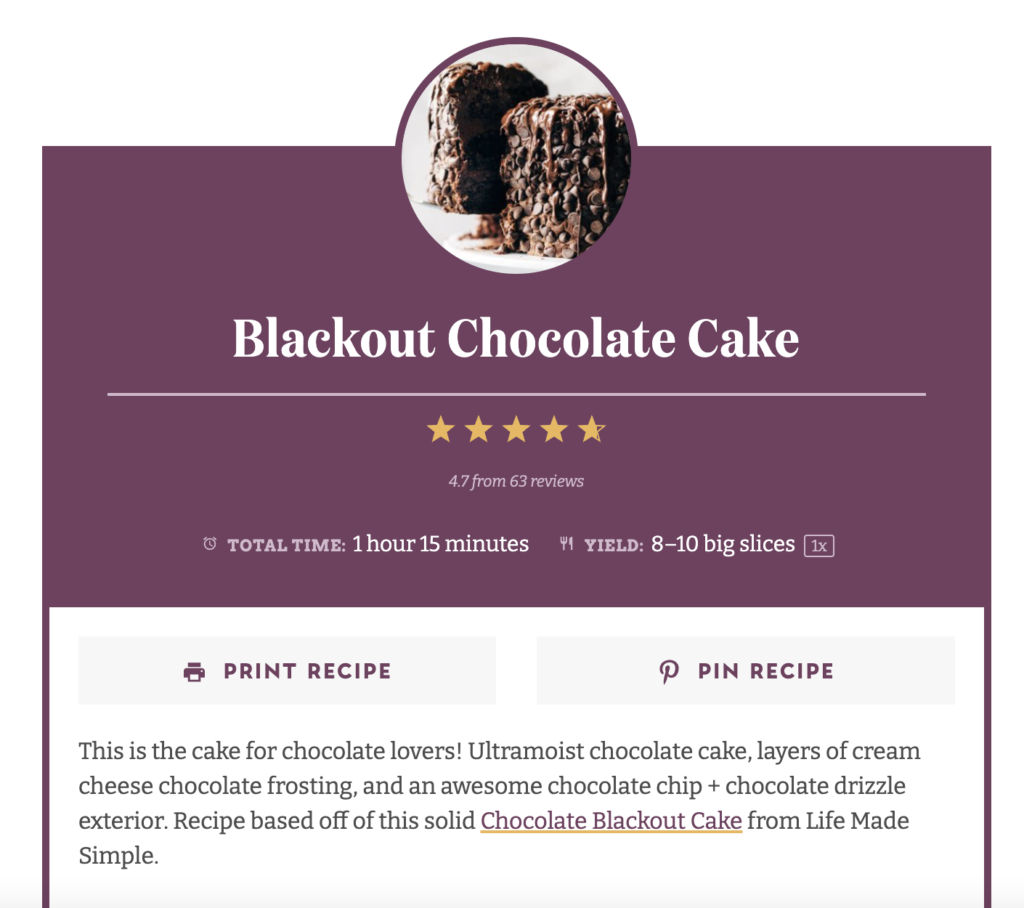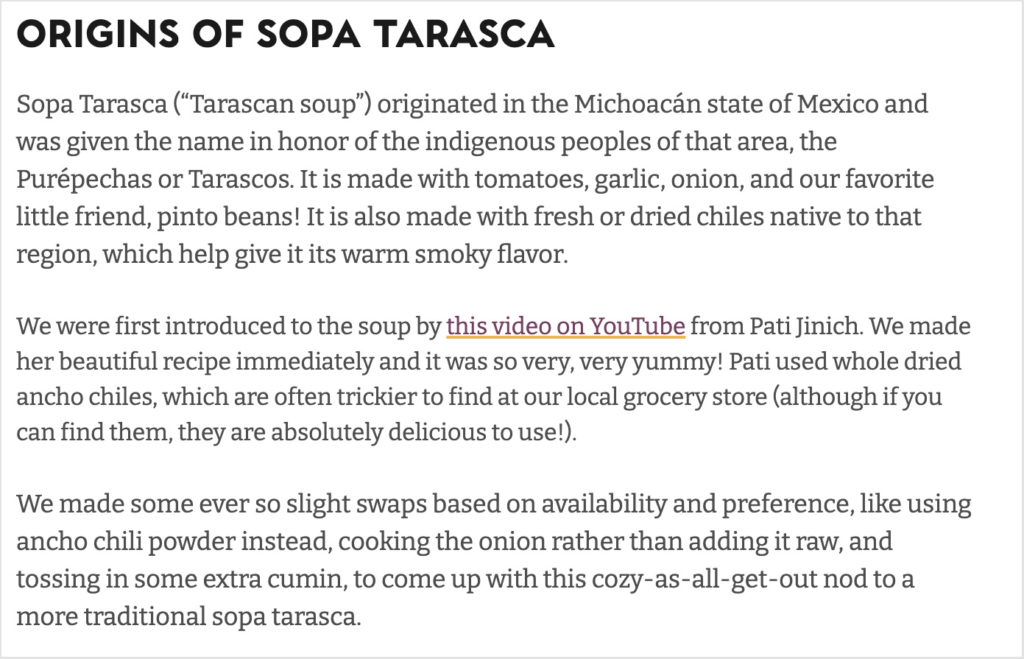As food bloggers and recipe developers, inspiration for recipes can come from many different places. Your grandmother’s famous pound cake, a new product at the grocery store, your local Italian restaurant, and yes, other published recipes can all get your creative cooking juices flowing.
There are lots of food blogs and cookbooks out in the world, and it’s only natural that you take inspiration from them. Whether you need a little guidance on the process for a complicated baking technique or want to riff on a unique flavor combination in someone else’s recipe, recipe adaption can come in many different forms.

But how exactly do you go about properly attributing your recipe to the OG recipe creator? That’s what we’re here to discuss!
P.S. We’re not going to get into the nitty-gritty details of recipe copyright in this post – though if you’re curious to learn more, check out this article and podcast episode!
What is recipe attribution?
Put simply, recipe attribution is when you share where the recipe originated from with your readers. Let’s explain recipe attribution with a little example:
Food blogger Lillian sees a recipe for pasta with butternut squash, spinach, hazelnuts and parmesan cheese in a cookbook. “How delicious does that sound?!” she thinks. She makes the recipe for her family, but makes a few substitutions based on what she has in her fridge and pantry. Lillian decides to swap out butternut squash for acorn squash, spinach for kale, and hazelnuts, for walnuts. She also adds some canned tomatoes. Lillian loves the final product, so she writes out the recipe in her own words, instructions and all. Lillian wants to give credit where credit is due, so she includes a sentence at the beginning of her blog post and in the recipe card, sharing that she found inspiration for this recipe from a cookbook, and links to the cookbook.
The last sentence in that example is a great model for recipe attribution. A complimentary mention of the original source (in the blog post and/or in the recipe card) is a good starting point, but a link back to that source is even better.
Here are some examples of recipe attribution from our sister site, Pinch of Yum:




Of course, there is a lot of gray area when it comes to recipe attribution. There is even a Food Blogger Pro forum thread all about recipe attribution that has been going strong for almost 10 years! One of the main causes for debate is about when, exactly, recipe attribution is necessary…
When do you need to provide recipe attribution?
A general rule of thumb is: if you change three or more ingredients in the recipe, and rewrite the recipe instructions in your own voice, you can consider it your own. Even so, stating that the recipe was “adapted from” or “inspired by” the original recipe is a good idea.
Want to learn more about finding inspiration for recipes?If you’ve altered a recipe so significantly that no one would recognize it as an adaptation of another recipe and written everything in your own words, attribution is not necessary. And, of course, some basic recipes are considered common knowledge (like mayonnaise, salad vinaigrette, or a simple pie crust), and don’t merit attribution.
Psst! David Leibowitz has a really thorough post on recipe attribution if you’re looking for more reading on the subject!
Why worry about recipe attribution?
There are so many recipes out there, it could be easy to think that no one would ever notice a little *borrowing* of a recipe.
But beyond the ethical implications of failing to disclose your sources, you would also be missing out on a potential SEO boost for your food blog.
You can think of proper recipe attribution (with the link to the original recipe) as an easy SEO strategy. Linking to relevant and helpful external sources makes your content more valuable and useful to the reader, which is always a win (both for your brand and for SEO)!
Want to know more about external links and SEO?Another potential bonus of recipe attribution is that, often, the story of where you found inspiration can make for interesting blog post content. Tell your reader about the recent visit to your favorite local restaurant that inspired the recipe, or share more about an incredible new cookbook you discovered. Recipe attribution doesn’t have to be boring!
When it comes down to it, we like to follow (and recommend!) the “better safe than sorry” mantra when it comes to recipe attribution.
But we’d love to know… what’s your strategy when it comes to recipe attribution?
This is a fantastic breakdown of recipe attribution! I especially appreciate the clear examples and the SEO benefits of properly crediting sources.
I recently tweaked a recipe for Butter Chicken that I found online, and it turned out amazing. While I made some changes to the ingredients and instructions, I definitely wanted to give credit to the original inspiration. I included a line at the beginning of my post mentioning the original source and linked back to their recipe.
We’re so glad you found it helpful and were able to apply it to your own blog!